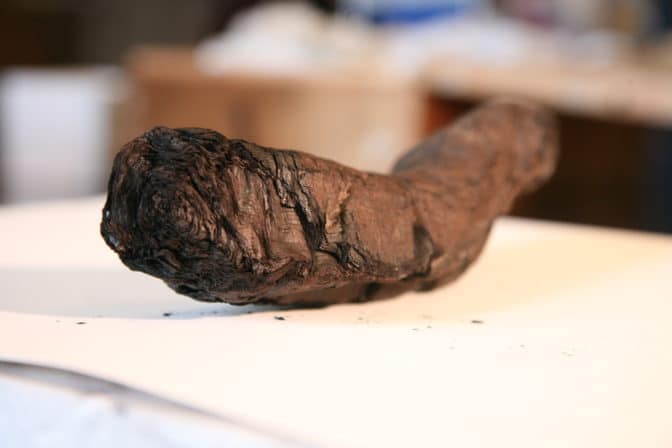Thanks to a viral trend sweeping social media, we now know some men think about the Roman Empire every day.
And thanks to Luke Farritor, a 21-year-old computer science undergrad at the University of Nebraska-Lincoln, and like-minded AI enthusiasts, there might soon be a lot more to think about.
Blending a passion for history with machine learning skills, Farritor has triumphed in the Vesuvius Challenge, wielding the power of the NVIDIA GeForce GTX 1070 GPU to bring a snippet of ancient text back from the ashes after almost 2,000 years.
Text Big Thing: Deciphering Rome’s Hidden History
The Herculaneum scrolls are a library of ancient texts that were carbonized and preserved by the eruption of Mount Vesuvius in 79 AD, which buried the cities of Pompeii and Herculaneum under a thick layer of ash and pumice.
The competition, which has piqued the interest of historians and technologists across the globe, seeks to extract readable content from the carbonized remains of the scrolls.
In a significant breakthrough, the word “πορφυρας,” which means “purple dye” or “cloths of purple,” emerged from the ancient texts thanks to the efforts of Farritor.

His achievement in identifying 10 letters within a small patch of scroll earned him a $40,000 prize.
Close on his heels was Youssef Nader, a biorobotics graduate student, who independently discerned the same word a few months later, meriting a $10,000 prize.
Adding to these notable successes, Casey Handmer, an entrepreneur with a keen eye, secured another $10,000 for his demonstration that significant amounts of ink were waiting to be discovered within the unopened scrolls.
All these discoveries are advancing the work pioneered by W. Brent Seales, chair of the University of Kentucky Computer Science Department, who has dedicated over a decade to developing methods to digitally unfurl and read the delicate Herculaneum scrolls.
Turbocharging these efforts is Nat Friedman, the CEO of GitHub and the organizer of the Vesuvius Challenge, whose commitment to open-source innovation has fostered a community where such historical breakthroughs are possible.
To become the first to decipher text from the scrolls, Farritor, who served as an intern at SpaceX, harnessed the GeForce GTX 1070 to accelerate his work.
When Rome Meets RAM: Older GPU Helps Uncover Even Older Text
Introduced in 2016, the GTX 1070 is celebrated among gamers, who have long praised the GPU for its balance of performance and affordability.
Instead of gaming, however, Farritor harnessed the parallel processing capabilities of the GPU to accelerate the ResNet deep learning framework, processing data at speeds unattainable by traditional computing methods.
Farritor is not the only competitor harnessing NVIDIA GPUs, which have proven themselves as indispensable tools to Vesuvius challenge competitors.
Latin Lingo and Lost Text
Discovered in the 18th century in the Villa of the Papyri, the Herculaneum scrolls have presented a challenge to researchers. Their fragile state has made them nearly impossible to read without causing damage. The advent of advanced imaging and AI technology changed that.
The project has become a passion for Farritor, who finds himself struggling to recall more of the Latin he studied in high school. “And man, like what’s in the scrolls … it’s just the anticipation, you know?” Farritor said.
The next challenge is to unearth passages from the Herculaneum scrolls that are 144 characters long, echoing the brevity of an original Twitter post.
Engaging over 1,500 experts in a collaborative effort, the endeavor is now more heated than ever.
Private donors have upped the ante, offering a $700,000 prize for those who can retrieve four distinct passages of at least 140 characters this year — a testament to the value placed on these ancient texts and the lengths required to reclaim them.
And Farritor’s eager to keep digging, reeling off the names of lost works of Roman and Greek history that he’d love to help uncover.
He reports he’s now thinking about Rome — and what his efforts might help discover — not just every day now, but “every hour.” “I think anything that sheds light on that time in human history is gonna be significant,” Farritor said.